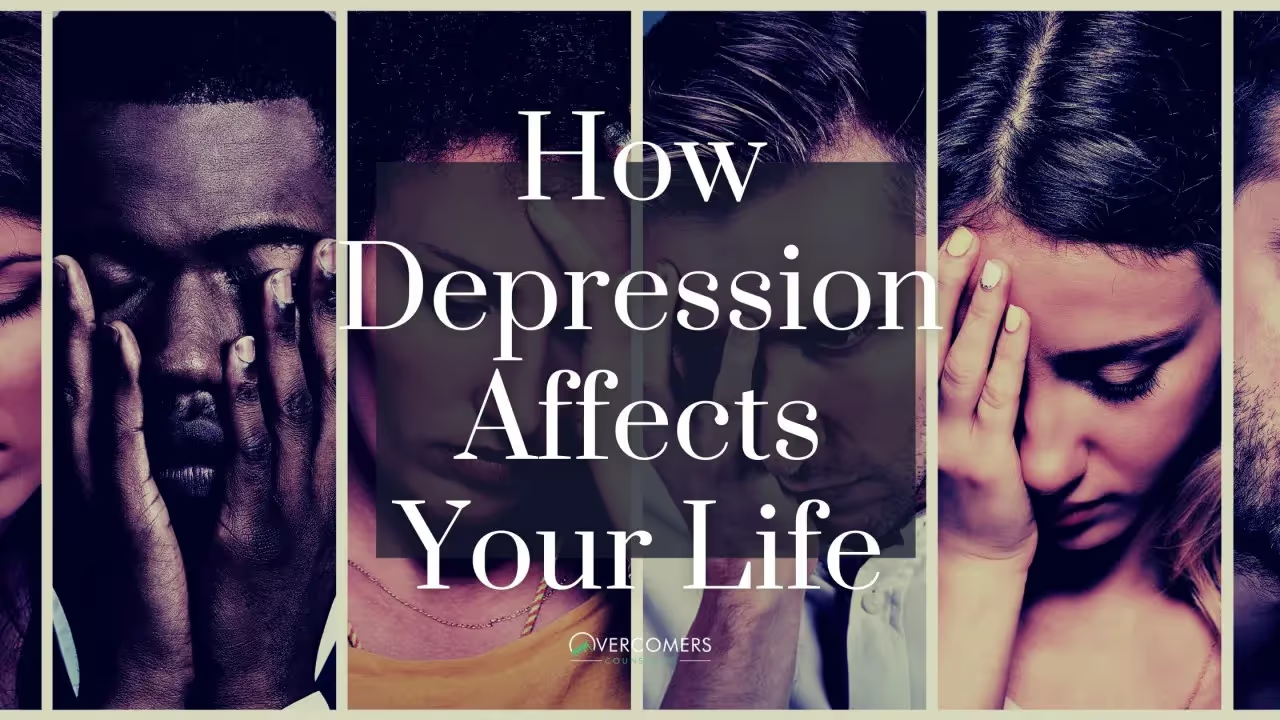How depression affects your life can be profound, devastating, and life-changing. Depression doesn't just affect one part of your life, like your moods. It...

How depression affects your life can be profound, devastating, and life-changing.
Depression doesn't just affect one part of your life, like your moods.
It can seep into every part of your life causing pain and disruptions in your work life, your sex life, and your social life.
The stereotypical person with depression is sitting on the couch watching television and eating junk food. But, this isn't true!
Most people who are suffering from depression are trying to go through their lives like normal.
They work, date, have friends, and have responsibilities - it's just that depression makes all of these things harder to do.
This is an important way in how depression affects your life: it can make it less enjoyable and seem like a chore. But, your life shouldn't feel that way.
The first great step to take is understanding how depression affects your life, so you can take it back.
How depression affects your work life can actually hurt your career. It can interfere with your motivation, your ability to complete tasks, and the purpose that you should get out of your work. In fact, many people feel depressed at work because they don't like their job or they find themselves in a toxic work environment. Dissatisfaction doesn't mean that you're depressed.
However, if you're struggling with depression you should know that it can impact your work life in negative ways.
This can include
If you're a student, depression may interfere with your ability to complete assignments or study for exams.
This can cause long-term effects on your career like loss of income or a job, missed promotion opportunities, and loss of purpose. If you're experiencing these effects, remember that it isn't you who isn't doing a good job: it's your depression interfering with your greatness.
It's an unfortunate side effect that fewer people talk about.
Many people who suffer from depression experience a noticeable reduction in their sex drive or libido.
This manifests as a loss of interest in sex.
This doesn't mean that your attraction to or love for your partner has changed. But, you might not ever feel in the mood.
Depression often affects interest across your life, and sex is no exception.
Research shows that how depression affects your sex life can include difficulties with sexual self-esteem (despite a continuing desire from a partner); feeling sexually distant from a partner; difficulty communicating about sex; and, insecurities about initiating sex.
Depression is often linked with low self-esteem and in the bedroom, it is no different.
This can cause a loss in libido as many people experience a loss of interest in the activities that they used to find pleasurable.
Increased irritability and pessimism can also be a deterrent to finding new partners even if depression doesn't affect your sex drive.
It's also worth noting that antidepressants can often lead to a loss in libido. If you're being prescribed them and are experiencing this side effect, then it's a good idea to talk to your doctor about it.

How depression affects your social life can take longer to appear. This is because friends typically see you less than a partner or a family member does and it might take them (and you) longer to notice the effects,
Research shows that social isolation is one of the most common ways in how depression affects your life.
People with depression are much more likely to become isolated from their social networks. Unfortunately, this isolation often leads to an increase in other symptoms. Social interaction is a necessary part of human life and critical to mental health and happiness.
But, it's not just your mental health that suffers from social isolation. Research shows that loneliness caused by social isolation and depression can lead to physical health problems as well. Being lonely means feeling disconnected from others, yet wanting to feel a connection.
Don't worry, if you feel like depression affects your social life. Your friends will be happy to hear from you.
Don't let depression prevent you from reaching out.
One often overlooked aspect of how depression affects your life, can be its impact on your spiritual life.
This can include losing touch with your faith; forgetting God; or struggling to find time for religious study or devotion; focusing on past mistakes instead of forgiveness; loss of joy in religious practice; negative thinking about your faith; and avoiding other members of your spiritual community.
No matter what religion you follow, spirituality has been linked to a more positive attitude, less depression, better health, increased ability to handle stress or anxiety, and more positive feelings overall.
This means that spirituality, like sex and friends, leads to better mental health.
Often, depression can keep us from doing the very things that would help us feel better.
Take a deep breath - depression can lead to more shallow breathing.
The fastest way to undo how depression affects your life, is to treat the actual depression.
Your work life, your sex life, your social life, and your spiritual life are not suffering because of you - they are suffering because of your depression.
Don't blame yourself.
Help yourself reclaim your life by getting the treatment for your depression that you need.
Yes! In fact, it's encouraged that you open up to your therapist so they can gain deeper insight into your individual situation and develop the most effective treatment plan possible that works best for you. Your therapist is there to serve as an unbiased source of support who will respect any thoughts or feelings shared within the session without judgment or criticism.
There are many helpful resources available, including support groups, online forums, books and websites dedicated to mental health and wellness. Connecting with other people struggling with the same issue can be especially beneficial. Additionally, talking to a trusted friend or family member can provide much-needed social support during difficult times.
Therapy provides many benefits for people battling depression. Research has shown that cognitive-behavioral therapy (CBT) is particularly effective in managing depressive symptoms. In addition, therapy can teach healthy coping skills and provide emotional support during difficult times. It may also be used as part of a comprehensive treatment plan which includes medication as well as lifestyle changes such as regular exercise and improved nutrition.
The duration of depression counseling varies for each individual, depending on the severity of their depression and their progress in therapy. Our therapists will regularly assess your progress and adjust your treatment plan as needed.
Ignoring depression can exacerbate symptoms and make it more challenging to manage over time. This can result in a negative impact on your personal, professional, and social life, leading to feelings of isolation and even thoughts of self-harm or suicide.
Addressing depression is crucial because it can significantly impact your quality of life, overall well-being, and ability to function in daily activities. Left untreated, depression can lead to more severe mental health issues, relationship problems, and physical health complications.